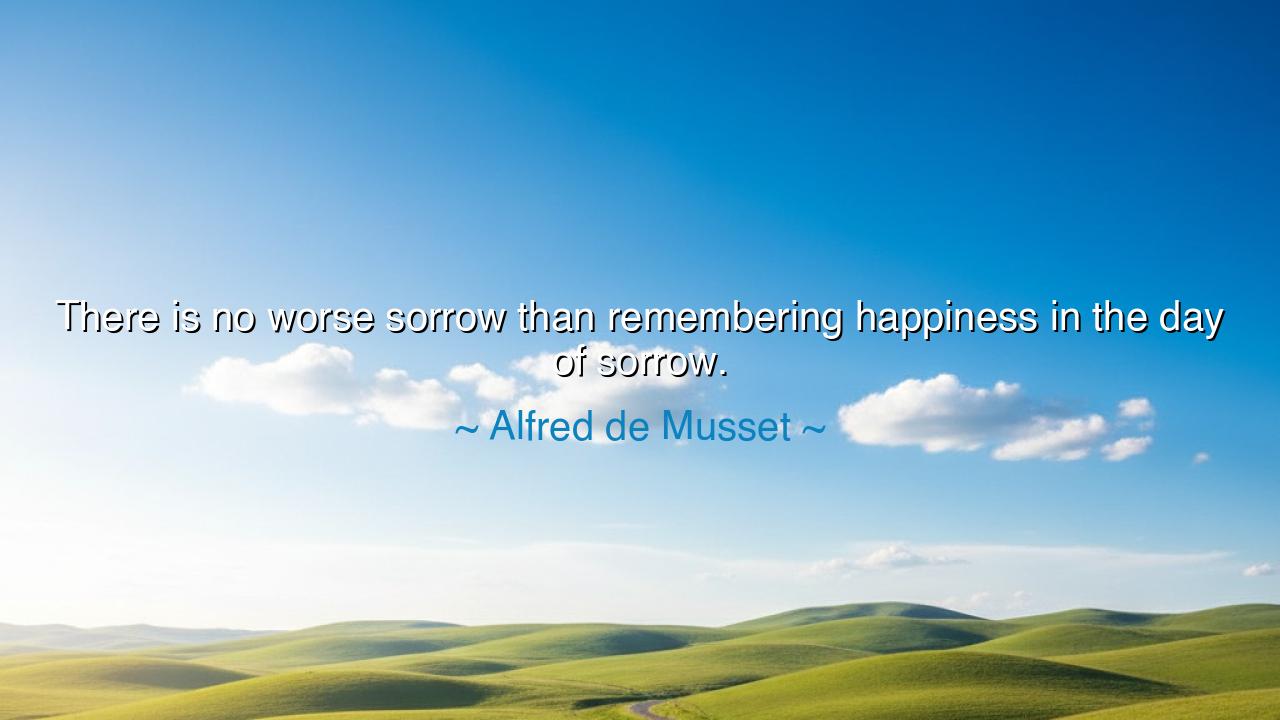
There is no worse sorrow than remembering happiness in the day of






In the haunting words of Alfred de Musset, the poet of passion and melancholy, we are confronted with a truth both timeless and piercing: “There is no worse sorrow than remembering happiness in the day of sorrow.” These words speak to the cruel interplay of memory and pain, where the heart, in its anguish, recalls joys that are now distant, irretrievable, and forever altered by circumstance. Musset reveals a paradox of the human soul: that even happiness, once pure, can become a source of suffering when the present is heavy with grief.
The origin of this reflection lies in Musset’s life, which was marked by intense emotion, unfulfilled love, and the often-turbulent currents of 19th-century French society. A Romantic poet and dramatist, he explored the depths of longing and the fragility of joy. He understood that happiness is ephemeral, that moments of delight are like sparks in the darkness — beautiful, yet fleeting. To recall them in times of sorrow is to hold a mirror to what has been lost, magnifying grief by the contrast with memory. In this way, the poet’s words resonate as both observation and warning: the mind can betray the heart, and memory can become a wound as sharp as the present pain.
The meaning of this quote extends beyond mere sentimentality; it is a meditation on the duality of consciousness. Happiness, once experienced, leaves its imprint on the soul. Yet sorrow amplifies this imprint, for memory now becomes a double-edged sword — a reminder of what was, and a measure of what is no longer. To remember joy in sadness is to feel the depth of absence, the void where delight once lived. Musset teaches that the human spirit carries both light and shadow, and that our capacity to feel deeply makes us vulnerable to this poignant sorrow.
History offers vivid examples of this truth. Consider King David, whose psalms often recount past joys — celebrations, victories, and the warmth of family — while he languished in exile, grief, or personal failure. The memory of happiness, when overlaid upon the weight of present trials, intensified his lament, making his sorrow almost unbearable. Yet through these reflections, David also demonstrates the resilience of the human spirit: memory, though painful, can guide the heart toward understanding, humility, and the eventual capacity for renewed joy.
Even in everyday life, Musset’s insight is clear. A widow remembering laughter shared with a lost spouse, a parent recalling the first steps of a child who has grown distant, a person who once knew friendship now fractured by betrayal — all experience the deep ache of remembering happiness in the day of sorrow. The sorrow is intensified because memory calls forth what the heart cannot reclaim. In this way, Musset exposes the fragile alchemy of joy and grief, showing that the human heart cannot separate the two; the sweetness of the past becomes bittersweet in the present.
Yet there is also a lesson within this sorrow: memory, even when painful, teaches the depth of our capacity to feel and love. To remember happiness is not merely to suffer; it is to acknowledge that life has touched us profoundly, that our hearts were alive and receptive. The depth of sorrow reflects the richness of past joy, and in recognizing this, we can cultivate compassion, resilience, and gratitude, even amid despair. Musset’s words, though steeped in melancholy, remind us that the human soul is capable of profound reflection and understanding.
The practical teaching of this insight is to embrace both joy and sorrow with awareness and acceptance. Do not fear to remember happiness, but temper it with mindfulness and compassion for the present. Allow memory to guide, not dominate, and use it as a source of wisdom: to cherish the fleeting moments of life while acknowledging that sorrow is an inevitable companion of the human experience. In this balance, grief may be softened, and joy may be appreciated even more deeply.
So, my child, take Musset’s wisdom into your heart: sorrow is intensified by the memory of happiness, yet it is also testimony to a life fully lived. Honor the past, endure the present, and remain open to the future, knowing that every sorrow carries the seed of understanding, and every memory, though painful, is a gift of the heart. In this way, the human spirit learns not only the depths of grief, but the enduring value of joy, and the courage to live fully amidst both.






AAdministratorAdministrator
Welcome, honored guests. Please leave a comment, we will respond soon